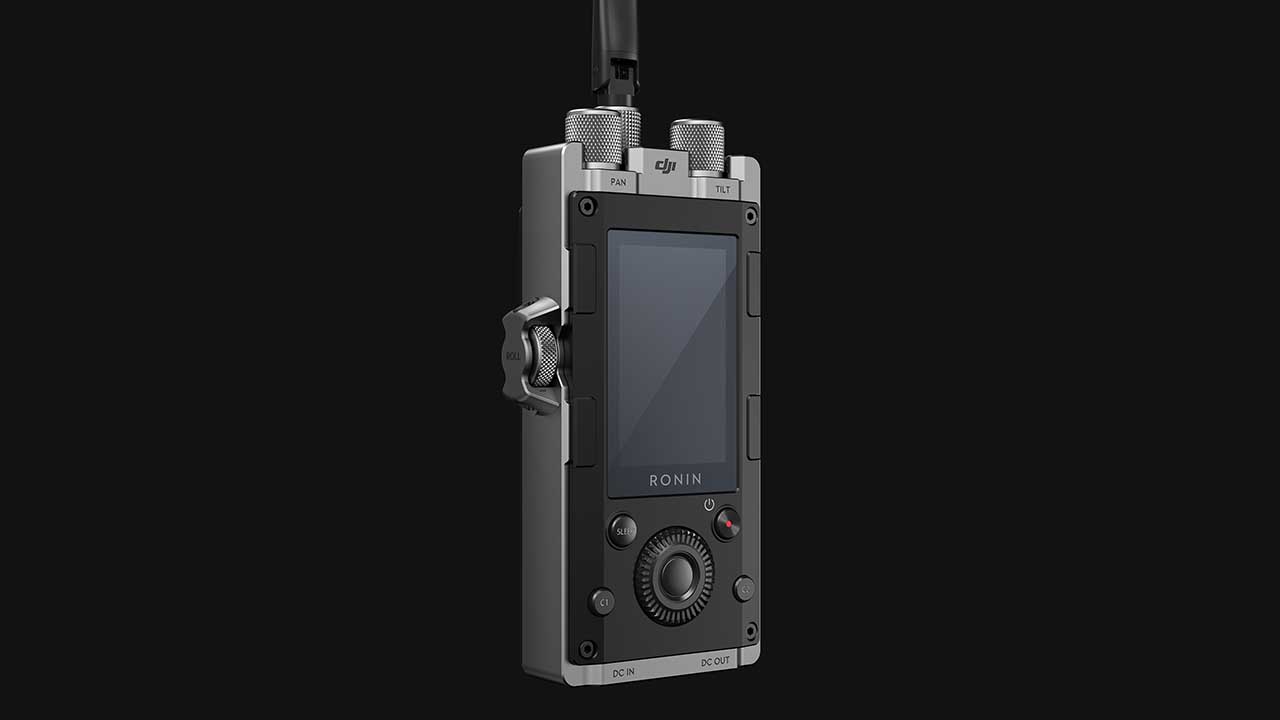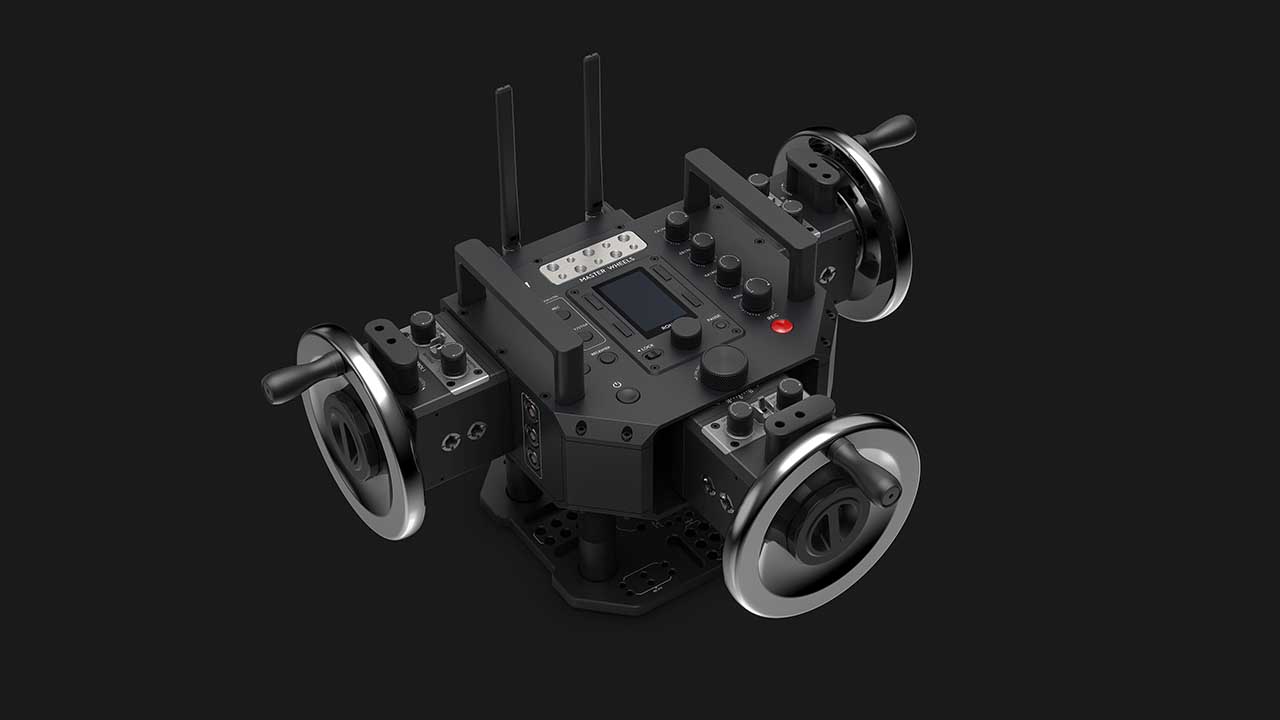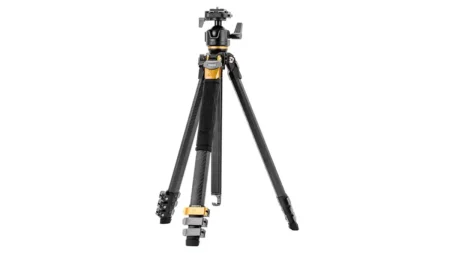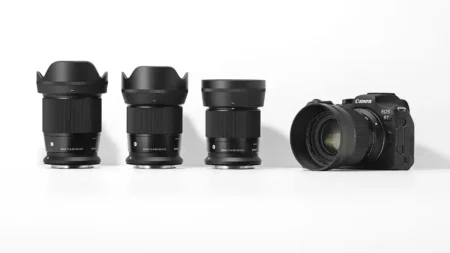DJI has announced two new cinema-grade gimbal control systems, introducing the DJI Master Wheels and DJI Force Pro at the NAB show in Las Vegas.
Aimed at filmmakers who want to capture complex shots, the DJI Master Wheels and Force Pro control DJI’s Ronin 2 and Ronin-S gimbals.
The Master Wheels promises precision via its weighted three-wheel design, which lets users adjust pan, tilt and roll more accurately, DJI claims. The company says:
Ultra-high resolution optical encoders detect the subtlest of wheel adjustments while complex algorithms translate that movement to enhance the level of accuracy of the gimbal. Master Wheels employ the latest sensor positioning technology along with dual-band low-latency 2.4/5.8GHz wireless transmission technology to ensure a stable and reliable connection from the main console to the moving rig with a latency as low as 10 milliseconds and an operating distance of over 1.9 miles (over 3 km).
Crafted for efficiency and ease of use, Master Wheels have an intuitive user interface offering quick access to gimbal settings along with the status of equipment. Three user customizable buttons offer the ability to save shortcuts while on-board motion capture storage enables the filmmaker to easily repeat the motion of the rig, allowing filmmakers to dedicate their attention to other aspects of the scene such as the actresses and actors. Built-in three-stop switches are capable of adjusting direction for each axis while dials manipulate speed, smoothness and dampening. Additionally, Master Wheels can change vital camera settings from the main console for a rapid response to any modifications an operator might need to make.
A modular design makes Master Wheels functional and versatile, helping to achieve the shot, no matter the situation. The three stainless steel wheels and the control modules have the ability to be swiftly detached from the main console and connected with a wire for space constrained shooting situations. The wireless transmitter can also be detached and remotely mounted via a 5-meter cord in order to gain a stronger signal when needed.
Filmmakers have the flexibility to attach various accessories using multiple 1/4” and 3/8” threads located on the main console such as external monitors. For added comfort during operation, the angle of one control module can be manually adjusted based on the preference of the user. Master Wheels can be mounted on a variety of platforms including inside vehicles, tripods and more with a dedicated Mitchell mount on the base of the main console.
Compatibility with an ecosystem of DJI products, as well as support for third-party gimbals, broaden the versatility of Master Wheels on set. Operators can direct gimbal movements using DJI’s professional products including the Ronin 2 and Ronin-S, taking full advantage of the latest in gimbal technology. DJI TB50 intelligent batteries, the same model used on the Ronin 2 and Inspire 2, power the system for up to 18 hours. For filmmakers with non-DJI equipment, Master Wheels support various third-party gimbals and can be powered through the DC-IN port to utilize V-Lock batteries from third-party manufacturers.

The DJI Force Pro employs a motion-sensing system and remote control technology to synchronise its movements with the gimbal to enable smoother footage.
The system is guided by an embedded compass and and Inertial Measurement Unit, which work together to maintain a consistent frame and prevent the gimbal from drifting. DJI says:
Its low-latency dual-band 2.4/5.8GHz wireless transmission system offers near real-time control with a communication latencyas low as 10 milliseconds. Force Pro can also be physically tethered to the gimbal using a CANBUS cable touting a 200Hz signal to eliminate any chance of connection interference while on set.
Designed for ease of use, Force Pro is an intuitive tool that filmmakers will quickly become proficient using, even with minimal familiarity operating gimbal control systems. Those lacking experience working with more complex products such as Master Wheels or even joysticks, the operation of Force Pro is quickly understood, breaking down barriers that come with using more advanced equipment on set. An optional lightweight handlebar adds to the efficiency of Force Pro, offering a total solution for handheld operation with the ability to mount various accessories to the handlebar, including monitors, video transmission systems, and thumb controllers.Operators can conveniently set two custom speed profiles and a built-in ultra-bright OLED screen provides equipment status along with the ability to control gimbal and camera settings for fast adjustments to a changing scene.
Force Pro is compatible with DJI Ronin 2 and Ronin-S gimbals along with other third-party systems. Operators can rely on Force Pro during extended film shoots with a battery life of up to 5 hours when fully charged, and recharging can be achieved several ways, via the USB-C, CANBUS port, or the built-in DC-IN port compatible with third-party V-Lock batteries.
Price & Release Date
The DJI Master Wheels price tag will be £7,100 / €8,000 for the three-axis model. A two-axis model will be priced £5,300 / €6,000 and a Single Wheel Control Module will run £1,100 / €1,200.
DJI says the Master Wheels release date will be June 2018.
The DJI Force Pro price tag will be £1,100 / €1,200, with a release date se for June 2018.
Both the Force Pro and Master Wheels are available for pre-order now.



